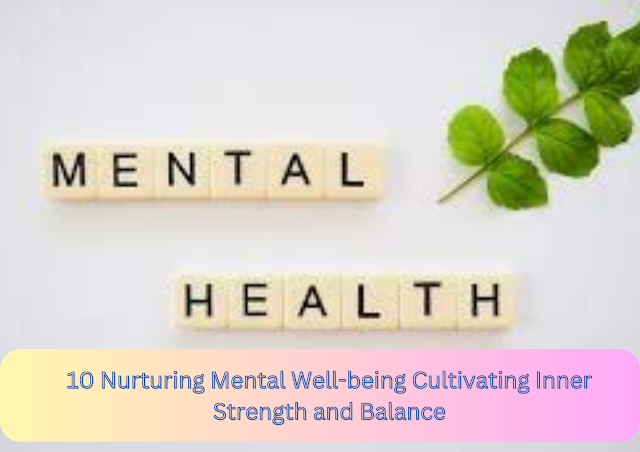10 Nurturing Mental Well-being Cultivating Inner Strength and Balance
Mental well-being is a cornerstone of overall health and happiness. It encompasses our emotional, psychological, and social well-being, influencing how we think, feel, and act. Just as we prioritize physical health, it is essential to prioritize our mental well-being. In this article, we will explore the importance of mental well-being and provide practical tips for nurturing and maintaining a healthy mind.
1 Understanding Mental Well-being:
Mental well-being is more than the absence of mental illness; it is about thriving and flourishing in life. It involves developing resilience, managing stress, maintaining positive relationships, and fostering a sense of purpose and fulfillment. Prioritizing mental well-being is crucial for optimal functioning and leading a fulfilling life.
 |
| 10 Nurturing Mental Well-being Cultivating Inner Strength and Balance |
2 Practice Self-Care:
Self-care is the intentional act of caring for our physical, emotional, and mental needs. Engage in activities that promote relaxation, self-reflection, and rejuvenation. This can include activities like practicing mindfulness, taking breaks, spending time in nature, pursuing hobbies, journaling, or engaging in creative outlets. Prioritize self-care regularly to recharge and nurture your mental well-being.
3 Cultivate Resilience:
Resilience is the ability to adapt and bounce back from adversity, challenges, or stressful situations. Build resilience by developing a positive mindset, practicing gratitude, seeking support from loved ones, and reframing negative thoughts. Embrace challenges as opportunities for growth and learning, and develop healthy coping mechanisms to navigate life's ups and downs.
4 Foster Positive Relationships:
Healthy relationships contribute to mental well-being. Cultivate connections with family, friends, and a supportive community. Surround yourself with people who uplift and inspire you. Invest time and effort in nurturing these relationships, as they provide emotional support, companionship, and a sense of belonging.
5 Prioritize Emotional Health:
Acknowledge and express your emotions healthily and constructively. Practice self-awareness and identify triggers that affect your emotional well-being. Explore activities that promote emotional health, such as engaging in hobbies, practicing deep breathing exercises, seeking therapy or counseling when needed, and practicing self-compassion.
6 Practice Mindfulness and Meditation:
Mindfulness involves being fully present at the moment and non-judgmentally observing our thoughts and emotions. Regular mindfulness practice, such as meditation, can help reduce stress, increase self-awareness, improve focus, and cultivate a sense of inner calm. Set aside a few minutes daily for meditation or mindfulness exercises to nurture mental well-being.
 |
| 10 Nurturing Mental Well-being Cultivating Inner Strength and Balance |
7 Maintain a Balanced Lifestyle:
Strive for a balanced lifestyle that includes regular physical activity, a healthy diet, adequate sleep, and time for relaxation. Engaging in stable exercise releases endorphins boosts mood, and reduces stress. A nutritious diet provides essential nutrients for brain health. Prioritize quality sleep to allow for rejuvenation and restoration of the mind.
8 Set Realistic Goals and Manage Expectations:
Setting realistic goals and managing expectations can help alleviate stress and promote a sense of accomplishment. Break larger goals into smaller, manageable steps, and celebrate each milestone along the way. Avoid comparing yourself to others and focus on your progress and growth.
9 Seek Support:
Remember, seeking support is a sign of strength, not weakness. If you're struggling with your mental well-being, reach out to trusted friends, family members, or mental health professionals. They can provide guidance, support, and additional resources to help you navigate challenging times.
10 Practice Gratitude:
Cultivating a gratitude practice can shift your focus toward the positive aspects of life. Regularly reflect on and appreciate the things you are grateful for, whether big or small. This practice promotes a positive mindset, enhances resilience, and cultivates a sense of contentment and well-being.
Conclusion:
Nurturing your mental well-being is a lifelong journey that requires conscious effort and self-care. By incorporating these tips into your daily life, you can enhance your mental resilience, promote emotional health, and cultivate a sense of balance and fulfillment. Remember, your mental well-being matters, and investing in it is a decisive step toward living a healthier and more fulfilling life.

0 Comments